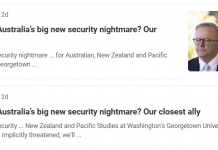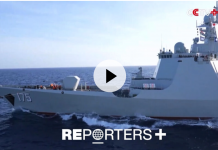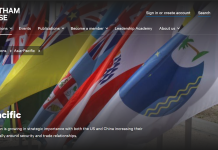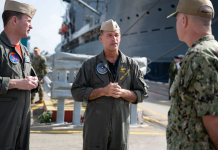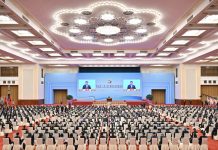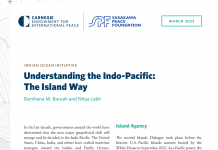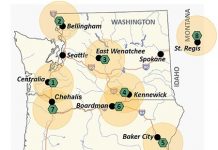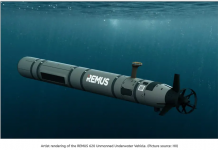–with Fiji Prime Minister, Hon. Josaia Voreqe Bainimarama, as guest of honour at the January 29th ceremonial opening of the Reconstructed Pacific Islands Forum Fale.
(Source statement with salutations: Fiji Gov)
…This year marks 50 years since the founding of the Pacific Islands Forum. Six sovereign nations and the Cook Islands came together in Wellington in 1971 to form what was then the South Pacific Forum. The small island states of the Pacific were newly independent, and soon more would join as new nations formed from the rapidly diminishing colonial presence in our part of the world.
Today we are 18 full members, plus associate members and partner states. Our success, however, is not just measured by our membership, because this is not a club; it is measured by our accomplishments, because we are a forum of sovereign nations confronting serious challenges in our region.
With the support from the larger countries of Australia and New Zealand and other partner states and organizations, Pacific Island states have boldly and unashamedly asserted our interests and exercised our rights as sovereign nations through this forum. We have never assumed that our size should relegate us to a back seat in determining the future of this region—or indeed, the world. And we never will.
So as we mark our golden anniversary this evening, we must take the opportunity to reflect on what we have achieved together, as one collective through the Pacific Islands Forum—and celebrate those achievements.
Together, we fought for a nuclear-free Pacific and committed to the Rarotonga Treaty.
Together, we negotiated and advocated what became the United Nations Convention on the Law of the Sea—and we are asserting our rights under that convention.
Together, we have refined and committed to a region of democracy, peace and strengthened regional security.
The Biketawa Declaration puts democracy and respect for human rights at the heart of our regional identity, and the Boe Declaration recognized an expanded and more modern and practical concept of security that includes human health and safety, cyber security and defense of the environment, and sets the framework for regional responses to these challenges.
Together, we have committed to work together for the future of all our people as one Blue Pacific.
Ladies and Gentlemen, I think we can all agree that the Pacific region today is vastly different than it was when those seven government Leaders first met in Wellington. We have grown, and many of the challenges and opportunities we now face have evolved with us. Some have gathered force over time like a cyclone moving over a warming sea.
Others have erupted suddenly and hit us in the face with crises we could not have imagined in 1971. Today’s challenges are more complex, more costly and more threatening. If we had not already been united, they would have impelled us to come together and form the strong partnership we have today.
In this day and age, we simply cannot meet the needs of our people and our region—or even our needs as sovereign nations—alone. Our strength lies in our solidarity as a region. This I firmly believe.
I read that the philosopher Benjamin Franklin once told his fellow American revolutionaries as they debated their young nation’s future, “Gentlemen, we must all hang together or most assuredly we will all hang separately.”
That warning is just as valid for the slow death of climate change and the devastation of the COVID-19 pandemic, as it is for death by the hangman’s rope. There is strength in solidarity and strength in common purpose and commitment. That is our great asset.
This pandemic has shown us in spades the importance of strong co-operation both within the region and with our international partners. With vaccines rolling out across the developed world, we must not allow our region to be cast to the fate of “immunity inequality”. Our people must be kept protected. Our economies must keep pace with what may well be the most important economic recovery in a century. For that to happen, COVID-19 vaccines must become available to our citizens, not months or – God forbid – years after the developed nations, but alongside them. Because we know none of us is safe, until all of us are.
And by the start of August this year, when our 51st meeting is to be held, planes must be flying in the Pacific.
Ladies and Gentlemen, as we look forward to ending the pandemic and restarting our economies, we can take heart that worldwide consensus on the need to reduce the rate of global warming is growing. I think we are all encouraged by the recent policy changes taken by US President Joseph Biden and by the strong team he is assembling to lead his nation’s effort. The USA’s re-entry into the Paris Agreement is a first step. Even more important will be the specific steps the Administration will take to reduce greenhouse gas emissions. Several were announced in the Administration’s first week. With the USA back in the game, I very much hope we will be able to welcome President Biden to the Pacific early in his administration.
Fiji as well has had a great week for the climate – signing a Forest Carbon partnership that will actually pay Fijians to keep our trees in the ground and even plant more given the powerful role that forests play in regulating the climate.
Ladies and Gentlemen, we are living in an evolving geo-political landscape amid strengthening strategic tensions in the Pacific rim. These very tensions reaffirm the need for a clear and strategic way- forward for regionalism.
The 2050 Strategy for the Blue Pacific Continent presents a strong opportunity for us to define the trajectory of our co-operation moving forward. And I hope to launch that initiative when Leaders meet at their 51st Pacific Islands Forum in Fiji later this year.
If 50 years since our founding have passed in the blink of an eye, imagine how quickly 2050 will be upon us. And Fiji’s expectations for the region over the next 30 years are simple:
By 2050, and not one day after, every economy in our region must achieve net-zero carbon emissions;
By 2050, we must have built a resilient Pacific, one that is adapted to the worsening climate conditions that we know await us;
By 2050, our region’s oceans must be secured by powerful protections that preserve their bounty and beauty for all time; and
By 2050, our continent, Oceania, must be connected by air, by sea and by technology.
By that mid-century mark, the divide between the developed and developing nations in our region must have given way to a level playing field, one defined by equal outcomes and opportunity.
I am in no doubt about the mammoth effort required to realise the vision of the 2050 Strategy. It will require commitment and consistent political will. It will require true and genuine partnerships. But commitment and will must be connected intimately with institutional structures that will guide and allow us to implement our plans effectively. In that light, work on the review of the regional architecture that is to begin in the coming months will be very important.
Ladies and Gentlemen, at a time so critical in our region’s history, I look forward to working closely with my fellow Leaders across the Pacific when I assume the Chair of the Pacific Islands Forum at our next meeting.
Ladies and Gentlemen, I am pleased and honoured now to declare this newly-built PIF Fale open.
Vinaka vakalevu. Thank you.–ENDS



